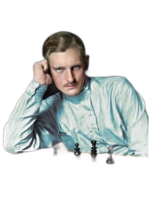
The Lesser-Known Sides of Alexander Alekhine: Beyond Chess Mastery
01.02.2024 04:53 | HistoryAlexander Alekhine was a Russian and French chess grandmaster and the fourth World Chess Champion. While many know of his chess prowess, there are several lesser-known facts about his life:
- Alexander Alekhine, a prominent chess grandmaster, faced a critical situation in the aftermath of the Russian Revolution. Due to his noble origins, a death sentence was issued against him. However, one of the judges, recognizing Alekhine's achievements in chess, argued in his favor, which played a role in saving him from this sentence. This incident highlights the precarious position Alekhine found himself in during a turbulent period in Russian history and showcases the unique respect and value attributed to his chess prowess.
- Alexander Alekhine's association with the Nazis during World War II is a controversial aspect of his history. There are claims that he published a series of articles in Nazi-controlled newspapers, which contained anti-Semitic content. These articles were later used as propaganda by the Nazis. However, the authenticity of these articles and whether Alekhine wrote them under duress or voluntarily remains debated among historians. Alekhine's actions during this period have significantly impacted his legacy, contributing to a complex and contentious historical figure in the chess world.
Alexander Alekhine's death in 1946 remains shrouded in mystery. He was found dead in his hotel room in Estoril, Portugal, under circumstances that have led to various theories. The official cause of death was reported as a heart attack, but due to the political climate of the time and Alekhine's complex history, including his involvement with the Nazis during World War II, there has been speculation about possible foul play or suicide. However, no conclusive evidence has emerged to support these theories, and the exact circumstances of his death are still a topic of debate among historians and chess enthusiasts.
- Alexander Alekhine was born into a wealthy Russian family in Moscow on October 31, 1892. His father, Alexander Ivanovich Alekhin, was a landowner and a Privy Councilor to the conservative legislative Fourth Duma. His mother, Anisya Ivanovna Alekhina (born Prokhorova), was the daughter of a rich industrialist. This affluent background provided Alekhine with a nurturing environment for his intellectual and chess development.
- Alexander Alekhine's political affiliations and activities are a complex aspect of his biography, marked by various controversies. During World War I and the Russian Civil War, he served in the Red Cross and later in the White Army, which opposed the Bolsheviks. After emigrating to France, he was accused of having pro-Nazi sympathies during World War II, primarily due to a series of articles published under his name in Nazi-controlled newspapers. These articles contained anti-Semitic content and were used as propaganda. However, the circumstances under which these articles were written – whether they were written under duress or voluntarily – are not clear. Alekhine's political stance, especially during the turbulent years of World War II, has been a subject of debate and has contributed to the complexity of his historical legacy.
- PK
